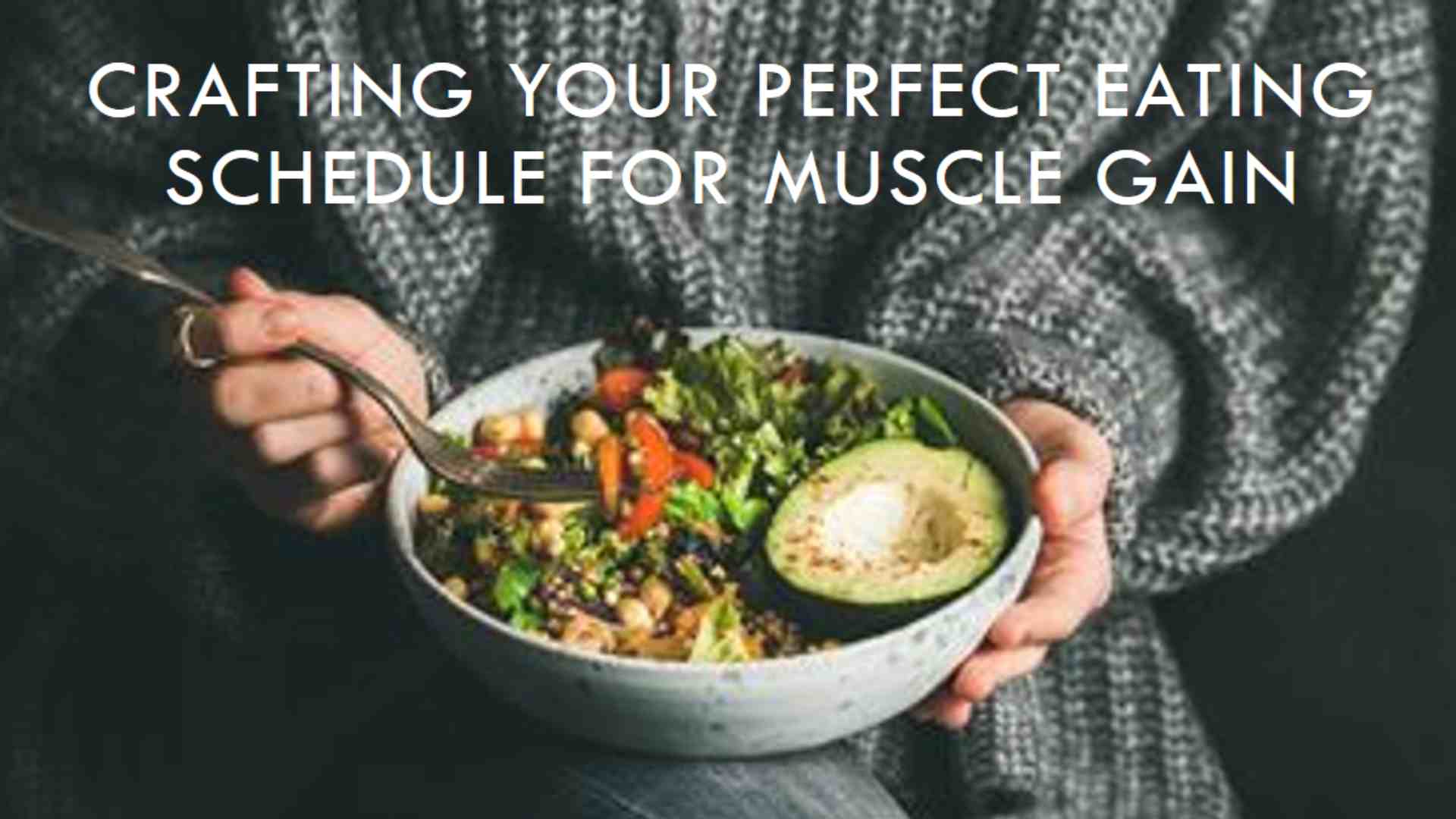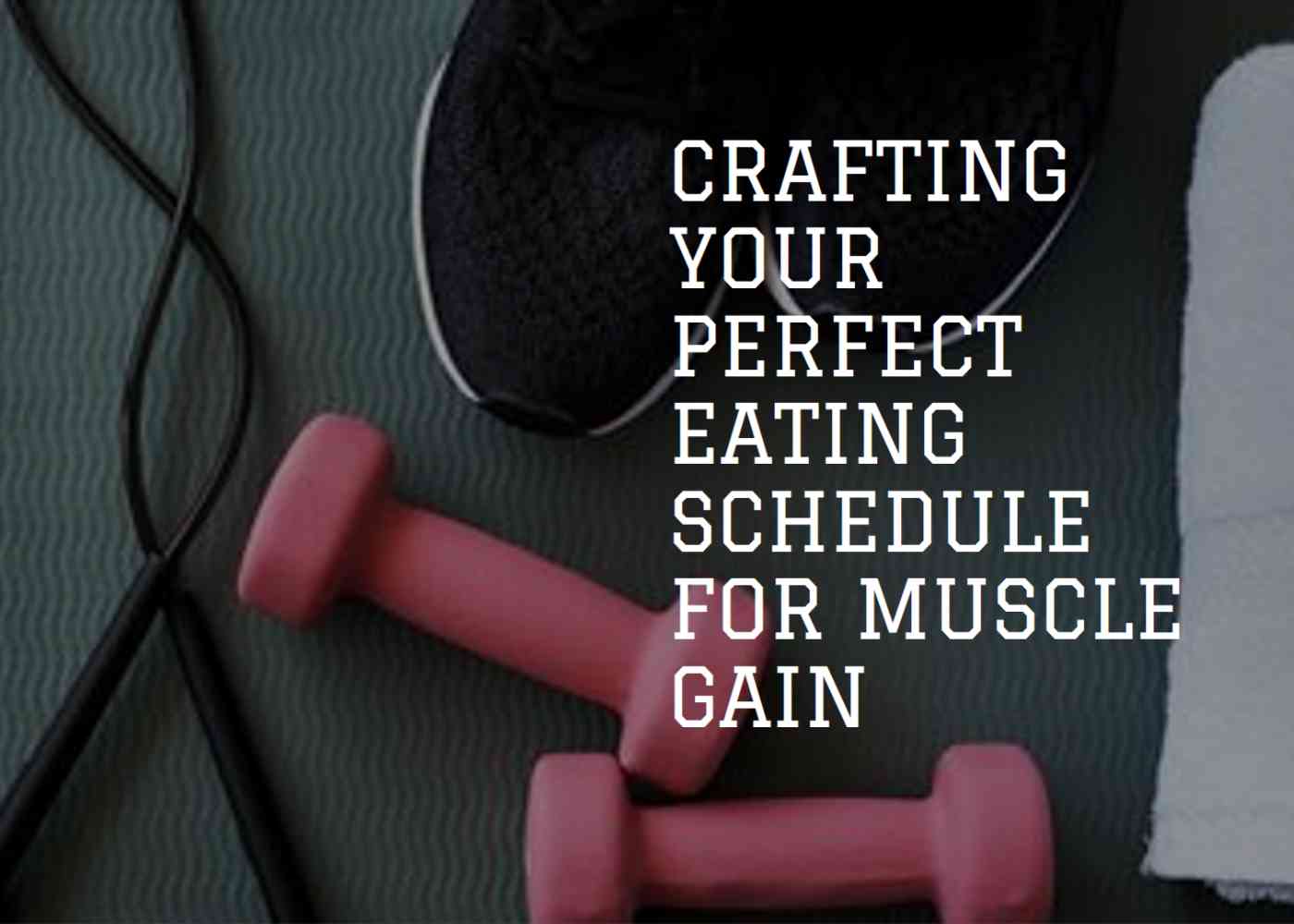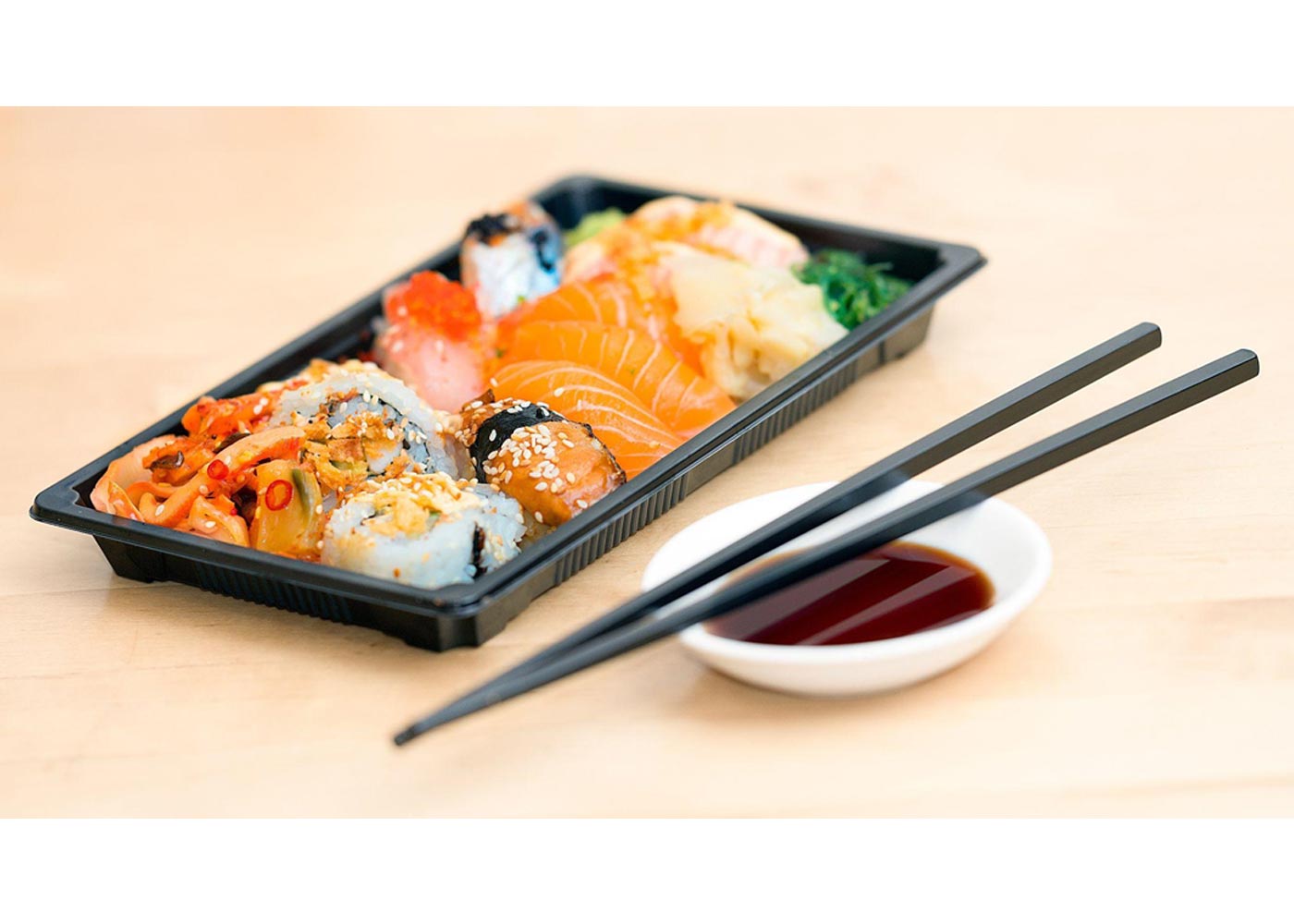If you want to gain muscle, you need to eat more than just protein. You also need to consume enough calories, carbohydrates, and fats to support your training and recovery. But how much should you eat, and when should you eat it? In this article, we will explore the basics of a muscle-building meal plan, including how to calculate your calorie and macronutrient needs, how to distribute your meals throughout the day, and what foods to choose for optimal muscle growth. Whether you are a beginner or an advanced lifter, this guide will help you craft your perfect eating schedule to gain muscle.

Maximizing Your Muscle Gains through an Effective Eating Schedule
Are you ready to take your muscle gains to the next level?
It's time to craft the perfect eating schedule that will fuel your workouts and
optimize your muscle growth.
Why is having an effective eating schedule important for maximizing muscle gains?
An effective eating schedule ensures that you provide your
body with the necessary nutrients at the right times. This helps in promoting
muscle growth, preventing muscle breakdown, and enhancing overall performance.
How can an effective eating schedule help in reaching your muscle gain goals faster?
When you have a well-planned eating schedule, you can
strategically time your meals to aid in muscle repair and growth. It helps sustain your energy levels, promoting protein synthesis, and optimizing
nutrient absorption.
Fueling Your Workouts: The Importance of Proper Nutrition Timing
Proper nutrition timing plays a crucial role in fueling your workouts and maximizing your muscle gains. When you consume the right nutrients at the right time, you provide your body with the energy it needs to perform at its best and support muscle growth.

But why is proper nutrition timing so important?
1. Energy and Performance
When you eat the right foods before your workout, you give
your body the necessary fuel to power through your training session.
Carbohydrates are particularly important in providing quick energy, while
proteins help in muscle repair and recovery. Timing your pre-workout meal or
snack ensures that your body has enough energy to perform at its peak and
prevent muscle fatigue.
2. Muscle Protein Synthesis
Consuming protein after your workout is essential for muscle
protein synthesis, the process by which your body repairs and builds new muscle
tissue. Timing your post-workout meal within 30-60 minutes after training can
optimize this process and enhance muscle growth. Including both fast-digesting
proteins like whey and slow-digesting proteins like casein can provide a
sustained release of amino acids to support muscle recovery.
3. Nutrient Delivery and Recovery
During exercise, your muscles undergo stress and damage.
Proper nutrition timing ensures that your body has the necessary nutrients to
repair and recover. Nutrients like carbohydrates replenish glycogen stores,
while proteins repair muscle tissues. Consuming a balanced meal or snack after
your workout enhances nutrient delivery to your muscles, promoting faster
recovery and reducing muscle soreness.
In conclusion, paying attention to proper nutrition timing is key to maximizing your muscle gains. By fueling your workouts with the right nutrients at the right time, you can boost your energy, support muscle growth, and speed up recovery.

Balancing Macronutrients: The Key to Muscle Growth
When it comes to maximizing muscle growth, balancing
macronutrients is essential. Macronutrients, which include proteins,
carbohydrates, and fats, provide the fuel and building blocks needed for muscle
development. Here's why finding the right balance is crucial:
Why is balancing macronutrients essential for muscle growth?
Proteins play a vital role in muscle repair and growth, while carbohydrates provide the energy needed for intense workouts. Fats contribute to hormone production and support overall health. Finding the right balance ensures that your body receives all the necessary nutrients to fuel muscle growth effectively.

What are the ideal ratios of macronutrients for maximizing muscle gain?
The ideal ratio of macronutrients for muscle gain can vary depending
on factors such as individual goals, body type, and activity level. However, a
general guideline is to aim for a diet consisting of approximately 40% of
calories from carbohydrates, 30% from proteins, and 30% from healthy fats.
Consulting with a nutritionist or dietitian can help personalize these ratios
based on your specific needs.
Remember, it's essential to focus on consuming high-quality
sources of macronutrients. Opt for lean proteins such as chicken, fish, tofu,
and legumes. Choose complex carbohydrates like whole grains, fruits, and
vegetables. Incorporate healthy unsaturated fats found in avocados, nuts, and
seeds.
Designing Your Personalized Meal Plan for Optimal Muscle Gain
When it comes to muscle gain, a one-size-fits-all approach
simply doesn't work. Each individual has unique dietary needs and preferences.
To maximize muscle growth, designing a personalized meal plan is crucial. Here
are some key steps to consider when creating your meal plan for optimal
muscle gain:
1. Determine Your Daily Caloric Needs
Before diving into macronutrients and meal timing, it's
important to determine your daily caloric needs. This can be done by
calculating your Basal Metabolic Rate (BMR) and factoring in your activity
level. Knowing how many calories you need will serve as a foundation for your
meal plan.
2. Set Your Protein Intake
Protein plays a pivotal role in muscle growth and repair.
Aim for a protein intake of around 1.6-2.2 grams per kilogram of body weight
per day. Distribute your protein intake evenly throughout your meals to
optimize muscle protein synthesis.
3. Choose Your Carbohydrate Sources Wisely
Carbohydrates are your body's primary source of energy. Opt
for complex carbohydrates like whole grains, fruits, and vegetables to fuel
your workouts and support muscle growth. Time your carbohydrate intake around
your training sessions for optimal performance.
4. Include Healthy Fats
Fats are an essential part of a balanced diet and contribute
to hormone production and overall health. Include healthy fats from sources
like avocados, nuts, and olive oil in your meal plan. Just remember to consume
them in moderation as they are calorie-dense.
5. Plan Your Meals around Training
Scheduling your meals around your training sessions is
crucial for muscle recovery and growth. Aim to consume a balanced meal
containing carbohydrates and protein 1-3 hours before your workout. After your
workout, consume a post-workout meal within 30-60 minutes to replenish glycogen
stores and kick-start muscle repair.
6. Monitor and Adjust
Once you have designed your personalized meal plan, it's
important to monitor your progress and make adjustments as necessary. Listen to
your body and make changes if you are not seeing the desired results. Keep in
mind that meal plans are not set in stone and should be adapted to meet your
evolving needs.
Remember, consistency is key when it comes to muscle gain. Stick to your personalized meal plan, stay dedicated to your workouts, and watch your muscles grow!

Scheduling Your Pre and Post-Workout Meals to Maximize Muscle Recovery
One crucial aspect of maximizing muscle recovery and growth
is ensuring that you have properly timed pre and post-workout meals. By fueling
your body with the right nutrients before and after your workouts, you can
optimize muscle repair and growth.
Benefits of Scheduling Pre and Post-Workout Meals
1. Enhanced Muscle Repair: Consuming a well-balanced meal
before your workout provides your muscles with the necessary fuel to power
through intense training sessions. This can lead to better muscle repair and
recovery.
2. Improved Performance: Proper nutrition before a workout
can increase your energy levels, allowing you to train harder and longer. This
can translate into better performance and more significant muscle gains in the
long run.
3. Muscle Protein Synthesis: Post-workout meals play a
crucial role in promoting muscle protein synthesis. Consuming protein-rich foods
after exercise helps rebuild and repair muscle tissues, leading to muscle
growth and recovery.
4. Reduced Muscle Soreness: Adequate nutrition after your workout can help reduce muscle soreness and speed up the recovery process. This enables you to get back to your training routine more quickly and consistently.

Tips for Providing the Right Nutrients
1. Pre-Workout: Aim for a meal that includes a combination
of protein and carbohydrates around 1-2 hours before your workout. This allows
enough time for digestion and provides sustained energy throughout your
training session.
2. Post-Workout: Consume a post-workout meal or protein
shake within 45 minutes after your workout. This is when your muscles are most
receptive to nutrients and can benefit the most from muscle repair and growth.
3. Protein Intake: Ensure that your pre and post-workout
meals contain an adequate amount of high-quality protein. This can come from
sources such as lean meats, poultry, fish, dairy, eggs, or plant-based options
like tofu or legumes.
4. Carbohydrate Balance: Pair your protein with a source of
carbohydrates for both pre and post-workout meals. Carbohydrates provide energy
and help replenish glycogen stores, supporting muscle recovery and growth.
5. Hydration: Do not forget to hydrate before, during, and
after your workouts. Drinking enough water and electrolytes is essential for
proper muscle function and recovery.
Remember, it is crucial to customize your meal timing and
nutrient intake based on your individual needs, preferences, and workout
intensity. Consulting with a registered dietitian or nutritionist can help you
design a personalized plan for maximum muscle recovery and growth.
Conclusion
Crafting a personalized eating schedule is crucial for
maximizing muscle gains. By fueling your workouts with the right nutrients at
the right time and balancing your macronutrients, you can optimize muscle
growth and reach your muscle gain goals faster. Designing a personalized meal
plan that takes into consideration your specific needs and preferences is
essential for achieving optimal results. Additionally, scheduling pre and
post-workout meals can aid in muscle recovery and provide your muscles with the
necessary nutrients they need to rebuild and grow. Remember, consistency is key
when it comes to nutrition and muscle gain, so stick to your eating schedule
and track your progress. With a well-crafted eating schedule, you'll be on your
way to achieving the muscle gains you've always desired.
If you wish to contribute to our blog, please email us on morhadotsan@gmail.com.























